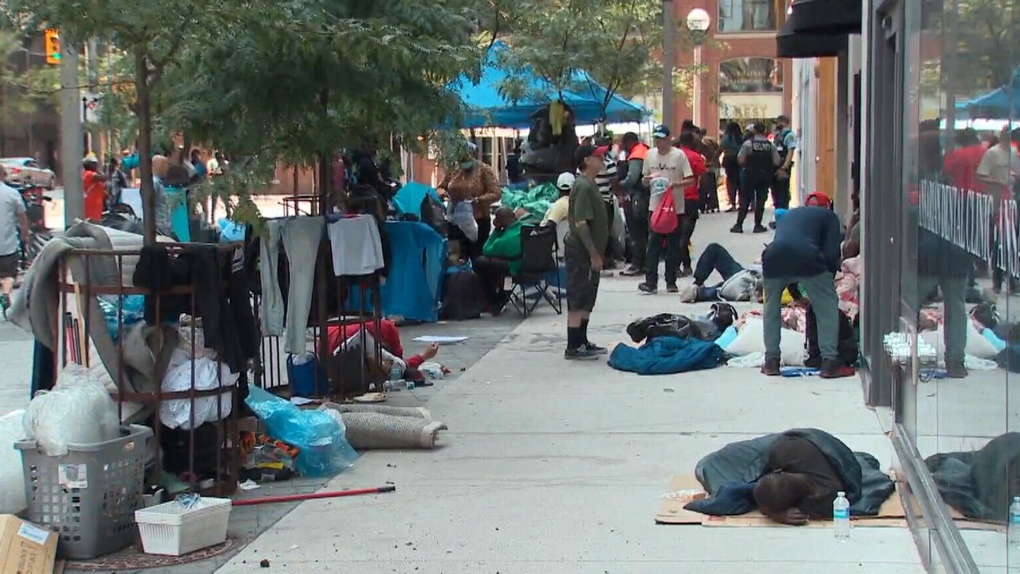DESIBUZZCanada
Events Listings
Dummy Post

International Day Of Yoga To Be Virtually Celebrated Saturday At 4pm

CANCELLED: Coronavirus Fears Kills Surrey’s Vaisakhi Day Parade

ADVERTISE WITH US: DESIBUZZCanada Is The Most Read South Asian Publication Online

SURREY LIBRARIES: Get Technology Help At Surrey Libraries

WALLY OPPAL: Surrey Police Transition Update On Feb. 26

GONE ARE THE DAYS - Feature Documentary Trailer

Technology Help At Surrey Libraries

Birding Walks

Plea Poetry/short Story : Youth Contest

International Folk Dancing Drop-in Sessions
Unwelcomed: Shocking To See Asylum Seekers Sleeping On Toronto Streets
- August 11, 2023

By Harinder Mahil
It was a shock for me to see and read news reports this week that asylum seekers are sleeping on the street in Toronto. It is something I expected to see in some European countries where right wing politicians are feeling threatened by brown and black faces coming to their shores and applying for asylum.
It is utterly shameful to see this happen in Canada’s largest city in the middle of summer when the country is facing extreme heat. If this is the treatment of asylum seekers from “a caring and compassionate country” what can we expect from countries which do not claim to be as caring as Canada.
Last week and this week emergency meetings were held between officials from three levels of governments (city, province and federal) to address the ongoing refugee crisis in Toronto and develop some sort of path forward. As expected, they all pointed fingers at one another.
The federal government is pointing fingers at the city, the city is pointing fingers at the federal government and the provincial government is missing in action.

The dozens of refugees, mostly from African countries, have been camping out on the sidewalk for several days, many using garbage bags to cover and protect their belongings. The city’s at-capacity shelter system has been turning away asylum seekers since the beginning of June after instituting a policy to instead refer them to federal programs.
When the US government contacted Canada and asked for its help to search for a privately-owned submersible that had gone missing last month, the Canadian government was quick to find resources for the search. The Transportation Safety Board also launched an investigation into its disappearance, citing Canada’s obligation under international law.
What about Canada’s obligations under the Convention Relating to the Status of Refugees also known as 1951 Refugee Convention? A simple reading of the Convention shows that the refugees have the right to housing, the right to education (Article 22), the right to freedom of religion (Article 4) and the right to access to justice.
Some commentators suggest that these people, who are sleeping on the street, are not refugees but rather are economic migrants. The fact is that a person who applies for refugee status has the right to have his or her application decided under Canadian laws and until then they have the rights provided to refugees.

At the time of writing the federal government has announced another $97 million to help the Toronto house an influx of newcomers. This announcement came after the advocates for the Black community stepped up and organized temporary shelter for over 200 people in a church basement in North York.
The federal Immigration Minister Sean Fraser told a news conference that, “Canada will continue to support the world’s most vulnerable people who seek our protection.” This announcement was made only after news stories about asylum seekers sleeping on the street appeared in the national as well as international press.
I hope that the three levels of government will find a permanent solution to the issue so that this does not happen again. There is a need to establish reception centres to shelter refugee claimants and offer them resources such as health care and legal services.
We must realize that those who come to Canada to seek asylum are human beings and deserved to be treated with dignity and respect. If granted asylum, they will contribute to strengthening Canadian society not only economically but also socially, culturally and politically.
Harinder Mahil is a human rights activist and is secretary of Dr. Hari Sharma Foundation.











